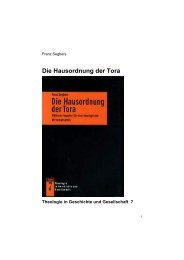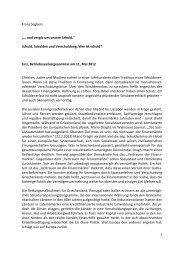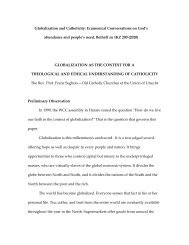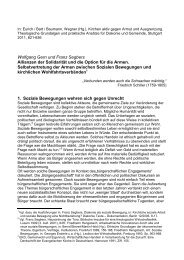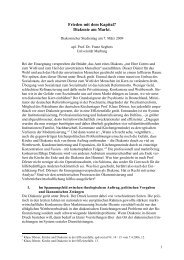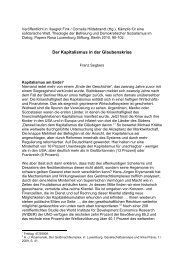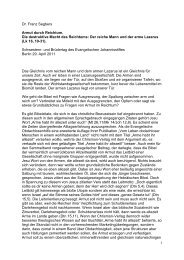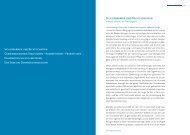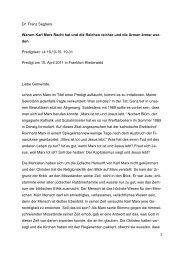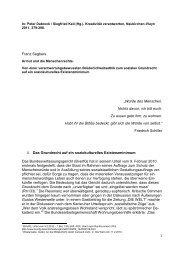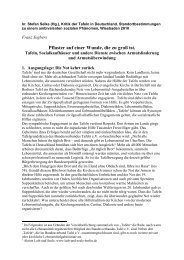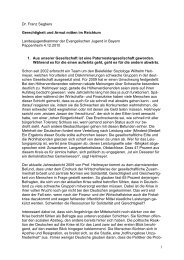Prof. Dr. Franz Segbers
Prof. Dr. Franz Segbers
Prof. Dr. Franz Segbers
You also want an ePaper? Increase the reach of your titles
YUMPU automatically turns print PDFs into web optimized ePapers that Google loves.
Globalization and Catholicity: Ecumenical Conversations on God’sabundance and people’s need, Beiheft zu IKZ 200 (2020)A Eucharistic Visionfor a World of Hunger 1The Rev. <strong>Prof</strong>. <strong>Franz</strong> <strong>Segbers</strong>—Old Catholic Churches of the Union of UtrechtMillions are hungry in the midst of a world of affluence. Is this only aneconomic question or an ethical and theological challenge as well? The situationin which we are living stimulates our faith in the Eucharist. In this situation, howis it possible to believe in the transformation of bread into the body of Christ andof wine into the blood of Christ? Is there any relationship between hope in thetransformation of hunger amidst affluence and belief in the transformation ofbread and blood?Eucharist is about Reality: The Crisis of Hunger Amidst AffluenceThe starting point of all reflection about hunger, bread, wine, and the giftof the Eucharist is to see that the existing economic system is able to accumulatewealth but unable to feed the people. Hunger and scarcity are increasing—andwealth, plenty, and affluence as well. 2 What is emerging as the worst food crisis1 Revised version: <strong>Franz</strong> <strong>Segbers</strong>, A Transformative Eucharistic Vision for the EntireOikoumene, in: International Journal For the Study of the Christian Church, Volume 90,Number 2 / May 2009, 138-150.2 Georg Erber / Martin, Petrick / Vanessa von Schippenbach, Ursachen und Konsequenzender steigenden Nahrungsmittelpreise, in: DIW Nr. 26 / 2008, 357-363.
20. <strong>Segbers</strong>Manila1 2in a generation has ignited riots and is threatening hundreds of millions withhunger. The author of an article in "Thinking it Over," a journal of the LutheranWorld Federation Department for Theology and Studies, wrote in May 2008 that"In 2006 desperate cries for food have reached new fevered pitches because of thedramatically higher costs of basic foods, such as rice, wheat and corn (maize)." 3Enough food is being produced to feed the world‘s population, but it is beingtransformed from food for people into a commodity for speculation."Thinking it Over" continues:As the global population continues to grow in size and in thequality of their diet, there are greater pressures on the global foodsupply. Energy and fertilizer costs are escalating. Development incountries like China and India has brought increased demand formore and better food, especially for meat that requires more grainand water and produce. Climate change has contributed tointensified droughts, floods, and other weather-related changesthat dramatically affect food productivity.At the same time, a significant proportion of some crops are[sic] now being grown not for food but for biofuels. (LWF 4)Hunger is being created not by God or nature but by the false economicorder of neoliberalism. ―The global food crisis is hitting with alarming speedand force, challenges the United States, other nations, and key international3 LWF Department for Theology and Studies, "Thinking it Over," Issue 19 (May 2008): 1–5,here 1; www.lutheranworld.org/what_we_do/dts/Thinking-it-Over/DTS-Thinking-19.pdf,acc. 8 Dec. 2009.edited to send 12/8/09 2
20. <strong>Segbers</strong>Manila1 3organizations to respond with a strategic and longterm approach.‖ 4 The presentglobal agricultural production and trading system, built in subsidies and taroffs,creates grave distortions. It structurally favors production among wealthycountries and disadvantages producers in poor developing countries.‖ (p. 4)Every day, one hundred thousand people die of hunger, and every sevenseconds, a child under the age of ten years dies of hunger. In 2006, Jean Ziegler,former U.N. Special Rapporteur on the Right to Food, said, in a widely reportedspeech, that ―Every child who dies of hunger in today‘s world has beenmurdered.‖ 5 He also warned that even though in 2007 enough food wasproduced around the world to feed 12 billion people, 854 million people wentwithout.Christophe Boureux, Janet Martin Soskice, and Luiz Carlos Susin havelinked human hunger to the Eucharist in the Introduction to the 2005 Conciliumissue on "Hunger, Bread and Eucharist":Too much hunger, too many mouths and not enough bread: thissituation reveals the menacing nearness of death. . . . This opens thespace for the Eucharist as a celebration of hunger, desire, and theBread given by God, but only if Eucharist itself is involved in thestruggle for justice. All that means that in our world, the same4 A Call for a Strategic U.S. Approach to Global Food Crisis. A Report of the CSIS Task Forceon the Global Food Crisis. Core Findings and the Recommandations, Washington July 2008,3, in: http://csis.org/files/media/csis/pubs/080728_food_security.pdf, acc 14 Dec 2009.5 "World Food Day 2008: Vegetarianism Against Global Hunger," Vegetarian and AnimalNews 16 Oct. 2008, www.evana.org/index.php?id=38147&lang=en, acc. 8 Dec. 2009.edited to send 12/8/09 3
20. <strong>Segbers</strong>Manila1 4world as that of Jesus but one in which bread does not multiply buthunger in fact does, the Eucharist and justice are joined together. 6What does it mean to believe in the transformation of bread and wine intothe body of Christ in the face of hunger? Do we believe that the world can betransformed from a world of hunger and scarcity into a world of fullness andsharing, as we believe that the bread and the wine is changed into the body ofChrist? 7Eucharist is about Transformation of the World: Eucharist as a ContactPoint of Liturgy, Ecclesiology, and EthicsThe Eucharist is faced with the food crisis. Bread is the fundamentalelement for celebrating Eucharist. The food crisis is our starting point when wereflect on the Eucharist. In this world of hunger, bread is not only food. Theeconomic crisis and disaster of an economic system that is able to produce morethan is needed but is unable to feed the people in the midst of abundance affectthe Eucharist. Food is for Eucharist not a non-theological factor. Bread and wineare staple foods. Bread and wine, daily food and drink, are essential for theEucharist. In a world of hunger, eating and drinking are more than themselves.We need bread and wine for living and worship. The food crisis is a eucharisticproblem.Eucharist is about the resources of the earth and basic human needs. AsBorueux, Soskice, and Susin put it:6 Christophe Boureux, Janet Martin Soskice, and Luiz Carlos Susin, "Hunger, Bread andEucharist," Concilium 40.2 (2005), www.concilium.org/english/intro052.htm, acc. 8 Dec.2008.7 Cf. Thomas Ruster, Wandlung. Ein Traktat über Eucharistie und Ökonomie, Mainz, 2006.edited to send 12/8/09 4
20. <strong>Segbers</strong>Manila1 5Bread, the biblical "food," is at the same [time] the most material,most bodily and most spiritual thing in Christian spirituality. TheEucharist, the mystery of faith, is bread. For this reason thesacrament is also a sign of our social nature, of the search for andthe giving of bread . . . and sign of the most primordial forms ofjustice and of gift. (Boureaux, et al.)Hunger is not only an economic or social challenge. The economic andsocial challenges of hunger are simultaneously theological challenges for thechurch. The crisis of hunger, the lack of nourishment, and the lack of breadconcerns the Eucharist. The Eucharist is the response to this impact. At the 1983World Council of Churches Assembly in Vancouver, the Faith and OrderCommission declared that a eucharistic vision was key not only to the unity ofthe Church but also to an integrated view of social and theological challenges:Christ—the life of the world—unites heaven and earth, God andworld, spiritual and secular. His body and blood, given us in theelements of bread and wine, integrate liturgy and diaconate,proclamation and acts of healing. Our eucharistic vision thusencompasses the whole reality of Christian worship, life andwitness, and tends—when truly discovered—to shed new light onChristian unity in its full richness of diversity. 88 WCC Faith and Order Commission, "Staying Together: Our Eucharistic Vision," wcccoe.org/wcc/who/anniversary-13-e.html,emphasis original, n.d., 27 Oct. 2009.edited to send 12/8/09 5
20. <strong>Segbers</strong>Manila1 6The Eucharist allows us to see the relationship between the challenge ofhunger and scarcity in the world of the Eucharist. 9 ―Before we can begin tounderstand the symbolism of the Eucharuist or try to fathom the message itconveys, we need to remember hunger.‖ 10 The sharing of bread and the strugglefor justice are not merely moral and ethical obligations of the church but ratherits constitutive elements. That means not only that churches have an ethic butthat ethical engagement is intrinsic to the very being of church. The church doesnot have only ethics; church is itself the sharing and breaking of bread. Theeucharistic vision explains the relationship between the Eucharist and ethicalbehavior. 11 The eucharistic vision holds together worship and action as a bridgebetween the liturgy of worship and the liturgy of daily life. Sharing of bread is anexpression of the ―koinonia of the Church.‖ In this spirit we have to ask whosuffers and who benefits from hunger. In what way does the transformation ofthe world begin in the Eucharist?Eucharistic vision is a theological key to generate imperatives concerningour proper ecclesial response to the dire effects of neoliberal globalization onhunger in the midst of affluence. 12 The crisis of food leads us to the heart of faithin the Eucharist. The catholic faith in the transformation of bread and wine intoChrist‘s body and blood creates the ability to transform the world. The9 John Poulton, Das Fest des Lebens. Theologische Reflexionen zum Thema – Jesus Christus,das Leben der Welt, (engl. Original version: The Feast of Life. A Theological Reflection on theTheme ―Jesus Christ – the Life of the World‖), Ökumenischer rat der Kirchen, Genf 1982, 16ff.10 Monika K. Hellwig, The Eucharist and the Hunger of the World, (Paulist Press/Deus Book)New York 1976, 12.11 <strong>Franz</strong> <strong>Segbers</strong>, Plädoyer für eine Eucharistische Vision, in: Christus Spes. Liturgie undGlaube im ökumenischen Kontext. Festschrift für Bischof Sigisbert Kraft Angela Berlis, Klaus-Dieter Gerth (ed.), Frankfurt 1994, 295-276.12 Cf. Margot Käßmann, Die eucharistische Vision. Armut und Reichtum als Anfrage an dieEinheit der Kirche in der Diskussion des Ökumenischen Rates, Mainz – München 1992.edited to send 12/8/09 6
20. <strong>Segbers</strong>Manila1 7eucharistic rites have a great deal to say about the proper Christian response tothe terror of world hunger that we face today. ―Jesus is the bread of life for theworld in a community sense.‖ 13 The cry for food is a cry for another world.Another world is possible and necessary. The transformation of bread and wineis a challenge to transform a world that is characterized by the neoliberal sloganpopularized by Margaret Thatcher, "there is no alternative." A different world ispossible.Eucharist is about Global and Catholic Realities: Church as koinoniaWhen we share the eucharistic bread, we share with others and share theirlives. Paul asked the Corinthians, "Is the bread that we break not a sharing in thebody of Christ?" (1 Cor 10:16). Speaking of the Eucharist as a body has dramaticeffects. All belong together. Nobody can say ―I have no need of you‖ (1 Cor12:21). The result is that ―if one part suffers, all suffer together with it‖ (1 Cor12:26). If one is hungry all suffer. That is why we have to ask "Why are theyhungry? What should we do about it?" In the early church the Corinthians weredeeply divided over the question of what it meant to be Christian in a societydivided between poor and rich, a division that arose while they were seeking theright way to celebrate the Eucharist.The problem was that the wealthy brought along special food, which theyselfishly reserved for themselves, thereby creating distinctions that shamed thepoorer brothers and sisters. In commenting on this situation Paul contrasts theLord‘s Supper with an ordinary meal, explaining the Corinthians' behavior as afailure to discern Christ‘s body (1 Cor 11:29), which is constituted by common13 Monika K. Hellwig, op. cit. 36.edited to send 12/8/09 7
20. <strong>Segbers</strong>Manila1 8participation in the Lord‘s Supper. The behavior of the affluent Corinthians inhoarding as their own what should have been offered to the Lord and thereforeto others threatened the very existence of Christ‘s body. 14 Unless bread isdistributed in a just way within the ecclesia, the body of Christ is destroyed. Thesharing of bread, especially among the needy, is essential for the celebration ofEucharist. The ecclesia, the church, was founded to do precisely this: to be anassembly of those who were previously separated. The eucharist is a paradigmfor social ethics.Mattijs Ploeger cites ―Anglo-Cathoilc Socialists who said that HolyCommunion makes us ‗Holy Communists‘ may have been exaggerating – andmost of them were not communists in the technical sense – but rightly pointed ina direction of communion and communal responsibility as the naturalcontinuation of the eucharist in daily life.‖ 15 This principle of sharing as afundamental act of the Lord‘s body is surely applicable not only to a singlecongregation but to the church universal. The use of the introductory formulabrings to mind Paul‘s version of the Last Supper (1 Cor 11:23–25). Paul quotedthe received account of Jesus‘ institution of the Eucharist in order to instruct acongregation in which some were getting drunk while others were goinghungry. Sharing food and drink with each other, especially among those who arewell to do and those who have nothing, is essential to the celebration of the14 Cf. Don H. Complier, The Eucharist and world hunger: An episcopalian reflection, in.Anglican Theological review 73, 1991, 267-279, here 269ff.15 Mattijs Ploeger, Celebrating Church. Ecumenical Contributions to a Liturgical Ecclesiology(Netherlands Stdudies in Ritual dn Liturgy), Tilburg, 2008, 535.edited to send 12/8/09 8
20. <strong>Segbers</strong>Manila1 9Christian eucharistic meal. 16 As Brian Wren notes in his 1986 Christian Centuryarticle, "Justice and Liberation in the Eucharist," "Though bread and wine areshared equally, this is not the equality of strict parity. None should go hungry orhave too much to drink (I Cor 11:21)." 17 For Paul the meal was linked to ethicalbehavior. No one will be hungry in the midst of wealth. Therefore Paul asks thequestion, ―Or do you despise the church of God and humiliate those who havenothing?‖ (1 Cor 11:22). Supper or Eucharist and ethics belong together.The central symbol of the ecclesia, the church as the body of Christ, is not aholy place and not ritualized worship, but the breaking and sharing of bread injustice and love. The community assembled around the table transcends the gapbetween poor and rich. ―Unless food is equally distributed among all membersof Christ‘s body, the celebration of the Eucharist becomes a profanation.‖ 18Eucharist makes us aware of the connection between the economy and the plightof millions. As is explained in "Thinking it Over," "Food is intimately linked tothe life of faith—through prayer ('Give us this day our daily bread,' diaconalsharing of food (Acts 6:1–6), and in worship (sharing the bread/body of Christ inHoly Communion" (LWF page). Eucharist—thanksgiving—starts with theprecondition that there is something to drink and to eat. This precondition iscentral to the Eucharist but is also a message for the world. To join the Eucharistmeans a commitment to struggle for bread for all. Hungry people are our16 Cf. <strong>Franz</strong> <strong>Segbers</strong>, „.... und alle aßen und wurden satt― (Mt 14,20). Meditation zu einerbiblischen Ökonomie des Genug – oder: Teilen macht satt, in: Kuno Füssel / <strong>Franz</strong> <strong>Segbers</strong>(ed.), „... so lernen die Völker des Erdkreises Gerechtigkeit.― Ein Arbeitsbuch zu Bibel undÖkonomie, Luzern – Salzburg 1995, 97-103.17 Brian Wren, "Justice and Liberation in the Eucharist," Christian Century (1986) 839;www.religion-online.org/showarticle.asp?title=1051, access 9 Dec. 2009.18 Don H. Complier, The Eucharist and world hunger, op. cit. 269.edited to send 12/8/09 9
20. <strong>Segbers</strong>Manila1 10observers when we share bread and wine. Hunger and the lack of food is achallenge for the churches celebrating Eucharist. For the spirit of Eucharist,denominational differences are not the central problem; rather, the problem isthe difference between those who are hungry in the midst of affluence and thosewho are living in affluence. „Bread for others is always a spiritual question.― 19As "Thinking it Over" puts it, "The Eucharist models an economy ofsharing, rather than of greed; a way of living so that), through all can eat" (LWF --). God‘s purpose of abundant food for all is contrasted with both Rome‘s falseclaims and our own neoliberal global false claims of having provided for all.Sharing is rooted in the Eucharist, and Eucharist is a practice of sharing.Eucharist is an expression of unity: worldly divisions are no longer perpetuated.The church is called to be the church as a sign of the final unity of all humankind,promised and initiated in the person of Jesus Christ. Ecclesiological problemscannot be studied in isolation from the context of the social progress and conflictsof the contemporary world. Becoming one world happens in each Eucharist.Christian unity cannot be separated from the unity of humankind. Unity inChrist is a unity of all, and this unity of all demands decisions—political,economic, and social.The church is what it is visibly and tangibly in one context: Eucharist.Eucharist is the high point and ultimate expression of catholicity. The essence ofcatholicity is to heal and to overcome each division between people. Koinonia andthe Eucharist are dramatic reminders of the essential oneness of the church. John19 Nikolaj Berdyaev, cit. in: Monika K. Hellwig, The Eucharist and the Hunger of the World,op. cit. 52.edited to send 12/8/09 10
20. <strong>Segbers</strong>Manila1 11Zizioulas has explained the significance of the Eucharist for our fragmentedworld: ―It is in the nature of the Eucharist to transcend not only divisionsoccurring within a local situation but also the very division which is inherent inthe concept of geography: the division of the world into local places.‖ 20 The rootmeaning of koinonia points to 'that which is held in communion'. The fellowshipof the communion of Christ is premised on a common faith, a commoncommitment, and a common task in the world. Christians share and participatein the same reality; they are one. The recognition of the common commitment toone Lord highlights the meaning of the Eucharist. Only a church with Eucharistis strengthened by word and sacraments and able to struggle against thedivisions between people. The Eucharist is an expression of global and catholickoinonia.What happens to one happens to all, because all belong to the one body.Indeed all are one body. What happens to some happens to all because all are thesingle body of Christ. As a sacrament of catholicity, the Eucharist is a sacramentof unity in life and life in unity. The unity of the church and the struggle for lifeare connected in the Eucharist.The notion of conciliarity has to do not only with being together in thesearch for truth but also with simply being together. Conciliarity is thus theprocess of the common responsibility of all Christians in their own cultures andsocieties for being true witnesses to the love of God as manifested in Jesus‘ life,death, and resurrection. It is then a small step to the autonomy of the local20 John Zizioulas, "The Local Church in a Eucharistic Perspective—An OrthodoxContribution," In Each Place: Towards a Fellowship of Local Churches Truly United (Geneva:WCC, 1977) 50–61, here 58.edited to send 12/8/09 11
20. <strong>Segbers</strong>Manila1 12church. The local church cannot on its own decide about the truth, but, togetherwith all other local churches, it is responsible for translating the truth of thegospel into its own cultural context.The unity of the church is an anticipation of the unity of humankind. Forthe church catholic, which lives in the midst of empire, unity in diversity is avisible sign of God‘s intention for the world. Catholicity deals withtransformative communities, transformed by the freeing of minds from thedominating imperial mindset. Empire and imperialism are the attempt to imposea single way of life on a plural world. Universalism must be balanced with a newrespect for the local and the particular. Catholicity balances the universal withthe local, so achieving both unity and diversity. To be church in an alternativelife and conduct is the central identifying sign of catholicity as the church movesbeyond its borders. By moving outside its own margins, the church can proclaimthe message of God: shalom for the hungry and peace for all. The adaptation ofChristianity to different cultures around the world has been one of the faith'sgreat achievements: we must continue such work in today‘s world. The formerArchbishop of Utrecht, <strong>Dr</strong>. Andreas Rinkel, therefore called the Eucharist ―amonument of unity.‖ The concept of eucharistic vision affirms the dignity ofdifference within the universal.Communion or conciliarity is the alternative program of catholicity in themidst of today‘s empire. The vision is universal but the setting local. Each churchin each culture contributes a gift to the totality of catholicity. The Eucharistedited to send 12/8/09 12
20. <strong>Segbers</strong>Manila1 13establishes a communion that is in conflict with the economic, social, andpolitical divisions of the world as it was in ancient Corinth.Eucharist is a path to understanding and a place to celebrate the church‘smission to the world, a mission that involves a liberating struggle against thepowers of disintegration. This understanding of the liturgy celebrates therelationship between injustice in the world and the justice proclaimed by thechurch.Eucharist Is the Remembrance of God’s History of Salvation: The LastSupper, Remembrance of the ExodusGod delivered his people from bondage in Egypt. The seder is theremembrance of Israel‘s history, as God called the people out of the house ofslavery. During their wandering through the wilderness they fell into a deep fearof starvation in the desert and complained of their hunger to Moses and Aaron.The Lord responded by sending bread—manna—from heaven.God‘s alternative has two characteristics:First, he instructed each family to collect no more than they needed. Therewas enough for everyone. They were each day to gather only the portionnecessary for the members of each household and to have nothing left over (Ex16:4–5).God combined this right to food with a second instruction: not toaccumulate or to hoard. And the people obeyed: ―The Israelites did as they weretold: some gathered much, some little. And when they measured it by the omer,he who gathered much did not have too much, and he who gathered little didedited to send 12/8/09 13
20. <strong>Segbers</strong>Manila1 14not have too little. They gathered as much as each of them needed‖ (Ex 16:17–18).God fed his people. He provided against hunger and scarcity.The Passover meal, which Jesus celebrated at the Last Supper, was a realmeal in remembrance of the Exodus and God‘s providential care. The hope offeeding the hungry is part of the messianic hope that is connected with thePassover night and the Passover meal at the time of Jesus. The Passover liturgystarts with the order that all who are hungry shall come and celebrate Passover.―Whoever is hungry, let him come and eat; whoever is in need, let him come andconduct the Seder of Pesach. This year [we are] here; next year in the land ofIsrael. This year [we are] slaves; next year [we will be] free people.‖ 21 Jewishtheologians confirm that the Last Supper was a seder, a Passover meal. J.J.Petichwoski notices ―from a formgeschichtliche point of view there remains thevery strong likelihood that, at any rate, the writers of the Synoptic Gospel sawthe origin of this institution in the seder service of the Jewish Passover.‖ 22Remember is a central term in the Bible. God remembers each person (Ps 8:5), Godremembers his covenant (Gen 9:15), and the Israelites remember God and whathe has done (Ps 42:7). In a biblical context, remember means not only to recall thepast but also to recognize God's presence. ―Christians see the eucharistprefigured in the Passover memorial of Israel‘s deliverance from the land ofbondage and in the meal of the Covenant on Mount Sinai (Ex 24). It is the newpaschal meal of the Church, the meal of the New Covenant, which Christ gave to21 Text of the Passover, in: http://www.sichosinenglish.org, acc 14. Dec 2009.22 Jakob J. Petuchowski, ―Do this inm remembrance of me‖ (1 Cor 11:24), in: JBL 76 (1957),293-298, here 293, cit. in: Michael Haarmann, ―Dies tut zu meinem Gedenken!‖ Gedenkenbeim Passa- und Abendmahl. Ein Beitrag zur Theologie des Abendmahls im Rahmen desjüdisch-christlichen Dialogs, Neukirchen-Vluyn 2005, 45.edited to send 12/8/09 14
20. <strong>Segbers</strong>Manila1 15his disciples as the anamnesis of his death and resurrection, as the anticipation ofthe Supper of the Lamb (Rev. 19:9). Christ commanded his disciples thus toremember and encounter him in this sacramental meal, as the continuing peopleof God, until his return. The last meal celebrating by Jesus was a liturgical mealemploying symbolic words and actions. Consequently the eucharist is asacramental meal which by visible signs communicates to us God‘s love in JesusChrist, the love by which Jesus loved his own ‗to the end‘ (John 13:1).‖ 23 WhatGod has done in the past is relevant for the present.Wren has brilliantly articulated the meaning of the Eucharist in thatcontext and in ours:Jesus chose to share bread and wine in the context of thatfoundational memory. There is more to be said about the Eucharistthan a longing for political and economic liberation, but never less.In the Eucharist, we follow Passover precedents by telling the storyof God‘s liberating acts. . . .Jesus took bread and a cup in the night when he would be betrayed.. . .He was betrayed to his people‘s religious-politicalauthorities and to a colonial power ruling an occupied country. Hisimpact on those authorities was the reason for his betrayal. Hisentry into Jerusalem was a public challenge, and his cleansing ofthe temple was an attack on the ruling families‘ economic power. . .Though not reducible to a political program, the announcement of23 World Council of Churches, Baptism, Eucharist and ministry, Geneva 1982, 10.edited to send 12/8/09 15
20. <strong>Segbers</strong>Manila1 16the impending Kingdom of God challenges and criticizes thestructures of society. To celebrate the Eucharist is to remember towhom Jesus was betrayed, why he was betrayed and executed, andwhy following him will bring us into conflict with today‘scorrupted political, economic and, yes, religious powers andauthorities. . . .First he took bread: "This is my flesh“ . . . , he said, meaninghis whole person, and then he announced that he would be handedover. . . . Next he took the wine cup. In Hebrew thought a person‘slife is in their [sic] blood. So Jesus said that his lifeblood would beshed. His disciples are to remember this handing-over andexecution with the full sense of remembering that is brought to thePassover liberation.To confront death is to witness to and collaborate with thelove that raised Jesus Christ from the dead. A four-dimensionalEucharist is celebrated when the eucharistic community critiquesabuses of political power, resists the powers of death in our world,and stands by the oppressed in their struggles for liberation. (Wren--)As Wren makes clear, the Eucharist is rooted in the Lord‘s Last Supper,and the Last Supper was a Seder in remembrance of the Exodus. 24 TheSalvadorian theologian Ignacio Ellacuría wrote of necessity for properlycontextualizing our liturgical texts: " . . . in themselves they are perfectly suited to24 Michael Haarmann, ―Dies tut zu meinem Gedenken!‖ op cit., 268ff.edited to send 12/8/09 16
20. <strong>Segbers</strong>Manila1 17our situation of institutionalized violence. We need only read them in a trulyvital way, relating them directly to our own context.‖ 25 Wren explains today'sfailure to celebrate the Eucharist rightly:The problem is that the actual practice of the Eucharist hasbecome so ritualized, privatized and abstracted from its historicalbasis and communal beginnings. . . .We get the words right, and take, bless, break, and share, don't we?So all must be well. Or is it? "Do this in remembrance of me." What is the"this" we are asked to do? . . .In answer to Wren's question, this means to respond to and enact Jesus‘life and message. Our mission is the missio Dei, to transform life and to strugglefor the needs of all human beings, especially those who are suffering, oppressed,and marginalized. In doing so, we do what Jesus said to do.The Eucharist is situated in the tradition of the Passover meal and recallswhat Johannes Baptist Metz has referred to as the ―gefährliche Erinnerung(dangerous memory)‖ of the liberating God. 26 As Wren explains, this meal linksthose participating with the wider community of all who labored to produce thefood and even beyond, with all creation and its life-giving power:It is significant that Christ used food produced by human labor, notberries plucked from trees. Someone has sown, reaped, milled,kneaded, baked and marketed the bread that the Lord blesses. . . .25 Ignacio Ellacuría, Freedom Made Flesh: The Mission of Christ and His Church, trans. John<strong>Dr</strong>ury (Maryknoll-New York: Orbis, 1976) 242, cit in: Don H. Complier, The Eucharist andworld hunger, op. cit. 267f.26 Johannes Baptist Metz, Gefährliche Erinnerung der Freiheit Jesu Christi, in: Johann BaptistMetz, Glaube in Geschichte und Gesellschaft, Mainz, 1977, 77ff.edited to send 12/8/09 17
20. <strong>Segbers</strong>Manila1 18Similarly, someone has pruned, plucked, pressed, racked, refined,bottled, labeled, advertised, transported, promoted and sold thefruit of the vine. Wine is a symbol of joy and celebration—intendedfor all. (Wren)In the Eucharist of the risen Lord, we offer a symbol of all basic foodproduced in our society, and by bringing the food we confess that our systems ofproduction do not distribute food equally. But Christ takes the food from us,changes it by his spirit, and ensures that all are fed. That is why Wren questionsthe wages that figures such as the baker and the vinedresser receive and placesthat question in the context of the Eucharist:To ask these questions is not to politicize the Eucharist but to faceits intrinsic meanings. The eucharistic celebration is not theoccasion to study and debate the causes of poverty and themechanisms of unequal distribution. But a church that sees theimplications of the Eucharist will . . . meditate—at the Eucharist—on how food is produced and sold. Before bringing bread and wineto the table, it will confess the scandal of starvation amid plenty.(Wren --)The Eucharist is the celebration of God‘s will against grain hoarded whilepeople starve, against every act that takes land and food from the poor. It is awitness to the hope and vision of a society where there is enough for all. That iswhy the Eucharist is not separated from reflecting, understanding, andstruggling for economic justice. That is part of the eucharistic memorial.edited to send 12/8/09 18
20. <strong>Segbers</strong>Manila1 19Since the earliest account, every Eucharist has been a remembrance of thetwofold offering. 27 Bread and wine are brought for the eucharistic sharing andfor sharing with the poor, ―the orphans and widows,‖ and all who are in need.The gifts to God and to the poor are the twofold offering. The practice ofbringing bread and wine both for liturgy and for the needy is an expression ofcatholicity, for as Wren declares, equality is essential to the eucharisticcelebration:In the Eucharist, all receive equally. . . .The Eucharist is an unambiguous reminder that the church iscalled to build itself on relationships of love and mutuality, notpower and domination—not for its own self-satisfaction, but as apolitical witness, a harbinger of the Kingdom of God. (Wren)There is neither Jew nor Greek, slave nor free, master norservant, employer nor employee. (Wren)The Lord‘s Prayer is recited in every Eucharist. ―We are requesting thatGod grant us, physical brad; there is no reason to believe that the greek wordartos should be used in a metaphorical or ‗spiritual‘ sense. Nutrition is part ofGod‘s providential care and thus a constitutive aspect of salvation and spiritualwhioleness.‖ 28 God is not indifferent to the needy. Neither can the church beindifferent. The faith of transformation in the Eucharist depends, as Wren andexplains, on the expectation of the transformation of social circumstances in thesense of the Kingdom of God:27 The following see: Don H. Complier, The Eucharist and world hunger. Op cit. 270ff..28 Don H. Complier, The Eucharist and world hunger, op.cit. 272.edited to send 12/8/09 19
20. <strong>Segbers</strong>Manila1 20The Eucharist looks forward to a society in God, a city for allthe nations, in which the last are first, the humble lifted high, andthe powerful repentant, as grace and peace forgive and unite allhumanity.If this is our hope, the supper should be celebrated not as ananaesthetic against the world's injustices but as a shout of joyfuldefiance and rebellion—a provocation and inspiration to make thatrebellion real in love and a song of reinvigorating hope that thefuture can break through into the present. (Wren)Eucharist is sharing and the hope of a just world for all. The celebration ofthe Eucharist is therefore an expression of hope in the coming rule of Godthrough Christ.The banquet imagery is not merely symbolic, for all are fed and none goeshungry anymore. ―We expect abanquet, and get a dry wafer and a sip of wine.We anticipate sitting at a table with our Lord, and instead must kneel and feelthe Spirit bringung Him inward remembrance.‖ 29 As nourishment for thejourney towards God‘s kingdom and as a sign of the food of the future age, theLord‘s Supper offers grounds for expectation even when the problems of hungerseem insurmountable. The Eucharist nurtures our confidence in God and ourcommitment in the struggle for justice by feeding the hungry, and it trusts inGod, who hears the cries of the starving. Thus celebrating is anticipating justicein the midst of our unjust present order with the vision of feeding all hungry29 Don H. Complier, The Eucharist and world hunger, op.cit. 277.edited to send 12/8/09 20
20. <strong>Segbers</strong>Manila1 21people. Fully granted strength for today, we remember the admonition to prayand cry out, "Thy kingdom come."Christ‘s presence in the Eucharist is the presence of the one who is tocome. Christ is not only above but also ahead of us, opening new possibilities oftransforming the world. The Eucharist as the breaking of bread also functions asa sign of the world to come, where there is enough for all.The Eucharist is about Hope for the Entire WorldWhat is the reality to which we hope the Eucharist will point? Whatprecisely is the sacrament? How is Christ realized as a mediator of justice for theworld in the Eucharist?The Eucharist is a paradigm for social ethics. The Eucharist has a greatdeal to say about the Christian response to the terror of hunger we face today.Thus we can change and transform the world through the Eucharist because weare called to do this in memory of Jesus Christ. Whenever the Eucharist iscelebrated without regard for its transformative power, its integrity and potentialare denied. Celebrating Eucharist, the church prefigures a new humanity thatbreaks and shares its bread. The Eucharist is the celebration of hope for thetransformation of the world. Therefore we should not emphasize the centrality ofa change in the elements but rather a change of the people into a new humanitywith new solidarity. This is a concrete hope for the world and for all hungrypeople. The celebration encourages us to struggle and outside the eucharisticassembly, with those who suffer and hunger, to realize what the assembly itselfedited to send 12/8/09 21
20. <strong>Segbers</strong>Manila1 22is practising. In so doing the church fulfils its mission of enhancing justice, peace,and joy—signs of the kingdom of God.Orthodox theology teaches the notion of ―liturgy after liturgy." 30Celebrating Eucharist generates a community that is moving toward justice andpeace. Eucharist is not simply ritualized worship, not merely a liturgy within thechurch. The theological connection between the real meal for the hungry and theLast Supper would be lost if that were the case. Rediscovering this fact is thestarting point for a new relationship among liturgy, Eucharist, and the strugglefor social justice.Sharing bread and wine is not only a possibility, not only a desire, notonly a hope of the poor and hungry—it is a concrete practice in each Eucharist.―By hinting at the full Biblical history of salvation, the liturgical text reminds usthat the proper celebration of the eucharist absolutely requires equal sharingamong all members of the body; that the consecreation of offerings for the poorrepresents the indispenable transition from hearing the Word to our response ofpraise and thanksgiving; that our prayers for the poor are in vain and evenblasphemous unless we assist in the answering of petition by extending all theheld required by the needy; and above all, participation in the eucharist is acatalyst for a personal encounter with our Lord, who reminds us forcefully of hismerciful deeds and uncompromisingly demands that we ally ourselves with Hiscause, thus anticipating, in the midst of our unjust present order, the yoyous30 See Stylianos Tsompanidis, Orthodoxie und Ökumene. Gemeinsam auf dem Weg zuGerechtigkeit, Frieden und Bewahrung der Schöpfung, Münster 1999, 169.edited to send 12/8/09 22
20. <strong>Segbers</strong>Manila1 23eschatological feeding of all hungry people.‖ 31 In the Eucharist is the beginningof a new world. ―Nowhere but in Judaism – and Christiantity – did divinesalvation involve such emphasis on the establishment of social justice and (this isthe point) lead to such an insistent appeal to man to assist, anticipate andemulate God by doing justice here and now.‖ 32 God comes into the history ofhuman beings with bread and a message: share this bread, break this bread. Dothis in remembrance of me.The hungry cannot wait. The feast of sharing is here and now when thechurch is celebrating Eucharist. The transformation of the world and thetransformation of bread into the Body of Christ mean this: real food and realdrink for the hungry and thirsty. When Christians celebrate Eucharist, they liveout the challenges and responsibilities of Eucharist in liturgy and after liturgy.The eucharistic vision is the centerpiece in the anticipation of theKingdom of God, expressing the unity of the local church and the global churchcatholic on one hand and transcending the gap between the hungry and wealthyon the other hand. Eucharist is an indwelling, a spirit, and a great school ofpeace, forming men and women who, at various levels of responsibility in social,cultural, and political life, can become promoters of dialogue and communion.Celebrating Eucharist means by the Spirit of God to become promoters of peaceand solidarity. The great challenge today is to convert the holy bread into realbread and to convert the liturgical peace into social justice and peace.31 Don H. Complier, The Eucharist and world hunger, op.cit. 278.32 David Daube, The New Testament and Rabbinic Judaism, London 1956, p.272 cit. in:Michael Haarmann, ―Dies tut zu meinem Gedenken!‖ Gedenken beim Passa- undAbendmahl. Ein Beitrag zur Theologie des Abendmahls im Rahmen des jüdisch-christlichenDialogs, Neukirchen-Vluyn 2005, 324.edited to send 12/8/09 23
20. <strong>Segbers</strong>Manila1 24The Eucharist calls us to become what we celebrate. Eucharist isparticipation in the bread and wine, and this is participation in the RisenChrist—not only as a devotional practice but precisely in the Christ present inthe poor, hungry, and naked. ―When you do this to one of the least of these, youdo it to me‖ (Matt 25:40). Where there is bread, there is God. Jesus is the livingbread for the hungry, and the church is his disciple. As Peter Maher has written:Eucharist inspires cooperation; calls people to action; organisesrallies; letter writing; sit-ins; poetry readings; book clubs; soupkitchens and theological reflection that that leads to action—all infavour of communion with the poor. . . . This is the real presence ofthe Eucharistic Christ—the literal presence of the poor in ourmidst—not tolerated but welcomed; not the object of our charitybut the subject and reality of our dream to live in Christ'spresence. 33The wealthy must give back to the poor what belongs to them. It is riskyto celebrate Eucharist, but that is the cost of being catholic.AbstractThis article questions wether there is any relationship between hope forthe transformation of hunger amidst affluenece and belief in the transformationof bread into body of Christ, and outlines a transformative eucharistic vision ofthe globals Christian Church. In a world of affluence are millions hungry. Itaddresses the question to wether this is an economic challenge or wether it alseposes an ethical and ecclesiological issue. The Eucharist is faced with the food33 Peter Maher, Parramatta Diocese Year of the Eucharist 4 June 2005, www.acmica.org/pub_mahereucharist.html,acc. 8 Dec. 2009.edited to send 12/8/09 24
20. <strong>Segbers</strong>Manila1 25crisis. The central action of the Eucharist ist the sharing of food – not only eatingbut sharing. Eucharist is about the resources of the earth and basic human needs.The Eucharist allows us to see the relationship between the challenge of hungerand scarcity in the world of the Eucharist. The church does not have only ethics;church is itself the sharing and breaking of bread. The eucharistic vision explainsthe relationship between the Eucharist and ethical behavior. The eucharisticvision holds together worship and action as a bridge between the liturgy ofworship and the liturgy of daily life. Celebrating Eucharist generates acommunity that is moving toward justice and peace.edited to send 12/8/09 25



